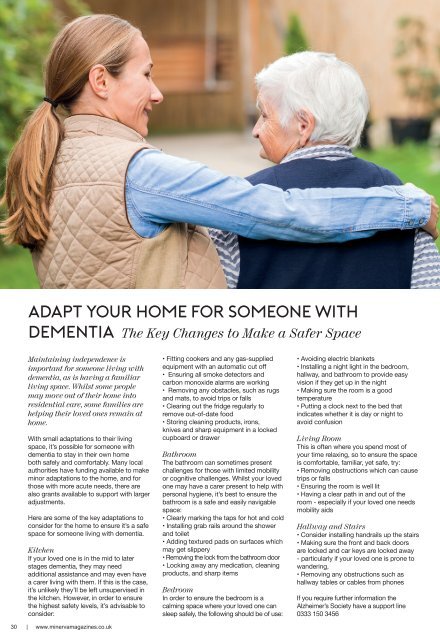Newmarket and Ely Living Jun - Jul 2021
The summer is here! Well, someone tell the sun! We won't let the rain dampen our spirits though, we've got amazing recipes, garden inspiration galore and loads of other amazing articles for you to dig into.
The summer is here! Well, someone tell the sun! We won't let the rain dampen our spirits though, we've got amazing recipes, garden inspiration galore and loads of other amazing articles for you to dig into.
Create successful ePaper yourself
Turn your PDF publications into a flip-book with our unique Google optimized e-Paper software.
ADAPT YOUR HOME FOR SOMEONE WITH<br />
DEMENTIA The Key Changes to Make a Safer Space<br />
Maintaining independence is<br />
important for someone living with<br />
dementia, as is having a familiar<br />
living space. Whilst some people<br />
may move out of their home into<br />
residential care, some families are<br />
helping their loved ones remain at<br />
home.<br />
With small adaptations to their living<br />
space, it’s possible for someone with<br />
dementia to stay in their own home<br />
both safely <strong>and</strong> comfortably. Many local<br />
authorities have funding available to make<br />
minor adaptations to the home, <strong>and</strong> for<br />
those with more acute needs, there are<br />
also grants available to support with larger<br />
adjustments.<br />
Here are some of the key adaptations to<br />
consider for the home to ensure it’s a safe<br />
space for someone living with dementia.<br />
Kitchen<br />
If your loved one is in the mid to later<br />
stages dementia, they may need<br />
additional assistance <strong>and</strong> may even have<br />
a carer living with them. If this is the case,<br />
it’s unlikely they’ll be left unsupervised in<br />
the kitchen. However, in order to ensure<br />
the highest safety levels, it’s advisable to<br />
consider:<br />
30 | www.minervamagazines.co.uk<br />
• Fitting cookers <strong>and</strong> any gas-supplied<br />
equipment with an automatic cut off<br />
• Ensuring all smoke detectors <strong>and</strong><br />
carbon monoxide alarms are working<br />
• Removing any obstacles, such as rugs<br />
<strong>and</strong> mats, to avoid trips or falls<br />
• Clearing out the fridge regularly to<br />
remove out-of-date food<br />
• Storing cleaning products, irons,<br />
knives <strong>and</strong> sharp equipment in a locked<br />
cupboard or drawer<br />
Bathroom<br />
The bathroom can sometimes present<br />
challenges for those with limited mobility<br />
or cognitive challenges. Whilst your loved<br />
one may have a carer present to help with<br />
personal hygiene, it’s best to ensure the<br />
bathroom is a safe <strong>and</strong> easily navigable<br />
space:<br />
• Clearly marking the taps for hot <strong>and</strong> cold<br />
• Installing grab rails around the shower<br />
<strong>and</strong> toilet<br />
• Adding textured pads on surfaces which<br />
may get slippery<br />
• Removing the lock from the bathroom door<br />
• Locking away any medication, cleaning<br />
products, <strong>and</strong> sharp items<br />
Bedroom<br />
In order to ensure the bedroom is a<br />
calming space where your loved one can<br />
sleep safely, the following should be of use:<br />
• Avoiding electric blankets<br />
• Installing a night light in the bedroom,<br />
hallway, <strong>and</strong> bathroom to provide easy<br />
vision if they get up in the night<br />
• Making sure the room is a good<br />
temperature<br />
• Putting a clock next to the bed that<br />
indicates whether it is day or night to<br />
avoid confusion<br />
<strong>Living</strong> Room<br />
This is often where you spend most of<br />
your time relaxing, so to ensure the space<br />
is comfortable, familiar, yet safe, try:<br />
• Removing obstructions which can cause<br />
trips or falls<br />
• Ensuring the room is well lit<br />
• Having a clear path in <strong>and</strong> out of the<br />
room - especially if your loved one needs<br />
mobility aids<br />
Hallway <strong>and</strong> Stairs<br />
• Consider installing h<strong>and</strong>rails up the stairs<br />
• Making sure the front <strong>and</strong> back doors<br />
are locked <strong>and</strong> car keys are locked away<br />
- particularly if your loved one is prone to<br />
w<strong>and</strong>ering,<br />
• Removing any obstructions such as<br />
hallway tables or cables from phones<br />
If you require further information the<br />
Alzheimer’s Society have a support line<br />
0333 150 3456


















